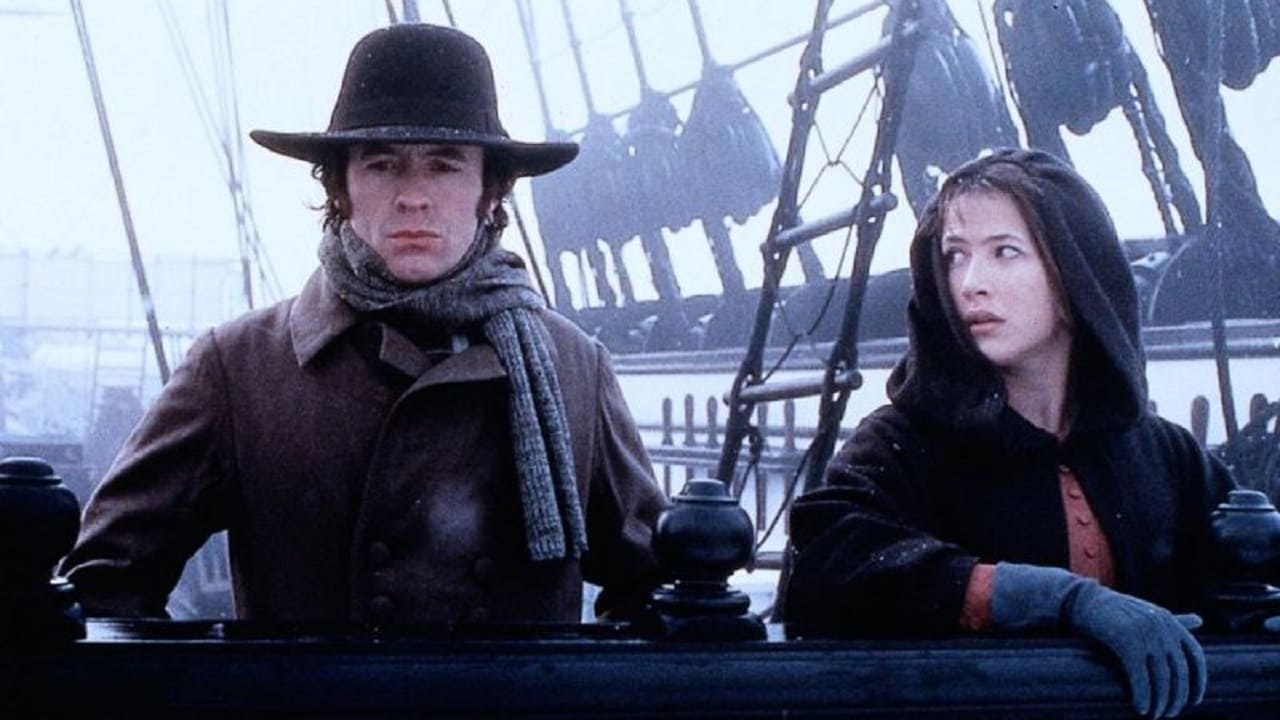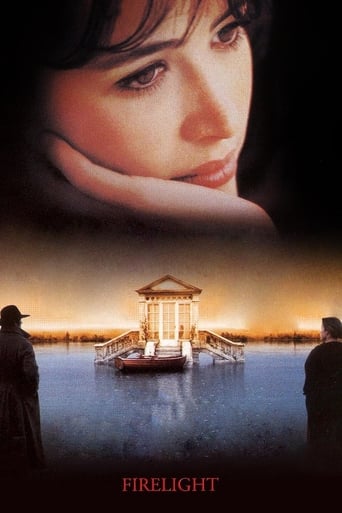

Most undeservingly overhyped movie of all time??
... View MoreGood concept, poorly executed.
... View MoreFrom my favorite movies..
... View MoreFanciful, disturbing, and wildly original, it announces the arrival of a fresh, bold voice in American cinema.
... View MoreFirelight is about: "It's a kind of magic. Firelight makes time stand still. When you put out the lamps and sit in the firelight's glow there aren't any rules any more. You can do what you want, say what you want, be what you want, and when the lamps are lit again, time starts again, and everything you said or did is forgotten. More than forgotten it never happened." 1838 Elisabeth Laurier agrees to bear a child of an anonymous English landowner, and he will in return pay her father's debt, giving up at birth, as agreed, the child. The first businesslike night is followed by the second, being on the dangerous verge to 'like-it' – while the third night is pure and forbidden pleasure. And she can't forget. The following film moments are seven years of the mothers writing of her diary "To my English Daughter." Searching and finally having found her she applies for the advertised governess (the fourth in this year). The upset father has to keep her according English law at least a month. Miss Laurier, confronted with her spoiled, tantrum-throwing daughter, asks the master of sheep breeding, what forms of discipline she may use during the four weeks: "None. She will soon find out the hard world we live in. As long as she is in my care I will that she is happy." But Miss Laurier takes own measures. He, the father entering his house, hears his daughters screams. The servant: "Miss Louisa, being educated" - the films most important saying. The fierce breeders-governess-confrontation compromise that she may resume. Louisa, forced to accept the new governess rule, mocks her: "Servant, servant, servant." And her governess-mother: "I am not a servant, I'm a prisoner. So will you be", telling the girl that after her marriage everything will belong to the husband and she the prisoner. If she doesn't marry, she is locked up in loneliness: "But they can't prison your mind. I want you to read. I want you to have your own life." The biological mother and her biological daughter take the hard way towards a relation of respect and trust both missed at birth according the deal. When the thin communicating ice holds, the film turns to the parents. Their, as remembered, started with the child breeding. Elisabeth has given her daughter rules. Able not only to be loved by her father-boy but others and the father-boy turning to a man. Much appreciated by Louisas grandfather. Louisa's eyes sense that something is between her father and this governess. And then, when discovering them in bed, the child rushes to her comforting lake-house-mother (none, not even the camera is allowed to enter the Lakehouse). The governess her mother, rushes after her: "Louisa, don't leave me." Only after the icy rescue time has come for Louisa to enter the governess room by her own and discovers the diary "To my English Daughter." The governess is her mother. Her real mother who gave her away: "I didn't, I sold you." £ 500 is a fortune: "I am glad it was a lot," the daughters answer. While Elisabeths father could not pay his debts and was in prison ... the reason for the deal between Elisabeth and Louisa's father. For Louisas grandfather and father it was different: a minor matter to sell the country estate. When Louisas father had relieved his wife from her pain (Louisa: "She was never my mother.") and Elisabeth: "You did it." Both have to live with this crime; she who initiated and he who executed. Three days they met. Then. The deal became different. Not meant. Seven years of search that finally ended the 'fourth day' for the father and mother and their daughter. A romantic tale that lets us believe that destiny asks for what is needed. But no: it needs the active moments that has to be taken before the happy ending.
... View MoreI have seen this haunting, romantic film many times. It's simply beautiful. Sophie Marceau and Stephen Dillane are a magnificent couple. Character development here is so profound that I have a hard time seeing either of them as anyone else other than their unforgettable characters from this romantic, bittersweet love story.It's especially candlelit, filled with firelight, foggy, and dim... old castle walls... beautiful costumes, bustiers, and the whole nine yards. The storyline is completely believable, sad, and still hopeful.It's JUST the kind of movie to watch on a rainy afternoon. I simply love it. Strong supporting cast and an all-but-perfect screenplay.It starts in 1836 England when a beautiful young unmarried woman from Switzerland arrives. In Switzerland, her father has been imprisoned and her family is destitute. She is answering an ad about a wealthy English landowner who needs an heir, but whose wife is in a vegetative state (and she has been for many years.) The young woman agrees to sleep with the gentleman for several nights in order to get pregnant, stay in England thru her pregnancy, and then give him the baby when it is born. In return, she will receive from him a great sum of money -- a small fortune -- the money she needs to get her father out of prison and get her family back on its feet again. All of this will be done in absolute secrecy and anonymity... they agree not to even learn each others' names, for the sake of his reputation.Doesn't this sound intriguing? It IS! It just gets better and better, too. I LOVE IT! So, rent it or buy it. Unplug the phone and darken the shades. Don't let anyone interrupt you during this unforgettable romance. ENJOY!
... View MoreIt's 1838 and Elisabeth Laurier, a Swiss young woman, must get money to pay for her father's debts. She agrees to enter into what might be viewed as an indecent proposal with Charles Godwin, a well to do English landowner, in having a sexual relation for the sole purpose of giving him a child his sick wife can't give him. Elisabeth must renounce to all claims of the baby. What starts as a pure sex, with Elisabeth suffering quietly while Charles has his way with her, suddenly turns into pleasure, seen on the young woman's face.Imagine Charles' horror when he returns from a trip to find out his sister-in-law Constance, has engaged Elisabeth as his daughter's governess. Louisa, who has terrorized previous attempts at receiving an education, rebels against this new stranger. Since by this time Charles' wealth has suffered a reverse, and having assured a moth's wages to Elisabeth, he consents in her staying. Charles' wife who is sick, is dying a slow death. It's inevitable that Elisabeth will have an effect on Charles and that she will be able to tame the wild Louisa into accepting her.William Nicholson, who wrote and directed "Firelight", created a film of great beauty. As it is, there are elements of other, better made movies, within the screen play, although it makes good entertainment. Nic Morris' cinematography gives the picture a glossy look that is appealing to the eye. Christopher Gunning's musical score serves the movie well.Sophie Marceau, an actress of great beauty makes an impression as Elisabeth. Stephen Dillard's Charles is equally appealing as the man tormented between duty and new found passion. Dominique Belcourt is perfectly bratty as Louisa. Joss Ackland appears as Charles' father and Lia Williams is Constance.As Gothic romance, "Firelight" will delight fans of the genre. William Nicholson directed his own story with great visual style.
... View MoreFirst, I loved it because I am such a sucker for love stories and Sophie Marceu and Stephen Dillane give superb performances...their love scenes steam up the screen...she is subtle and controlled and he is so sexy, despite his brooding character. I don't want to moralize but what I hated were the values conveyed in the film--"when the lights go out, there are no rules...you can do anything you want..." And that is what the lead actor does in the end--he does something really despicable--while what he does leads to a so-called "happy" ending--it leaves the viewer with a bad taste in the mouth. "The end justifies the means." Ugh. I expected the film to have a tragic ending because of the lead actor's action--bad action leads to bad consequences after all. I just wish the script were revised to make it a truly happy ending...the moral ambiguity certainly does not make it a happy ending! The director could have chosen to end it tragically or happily with slight changes to the script.
... View More